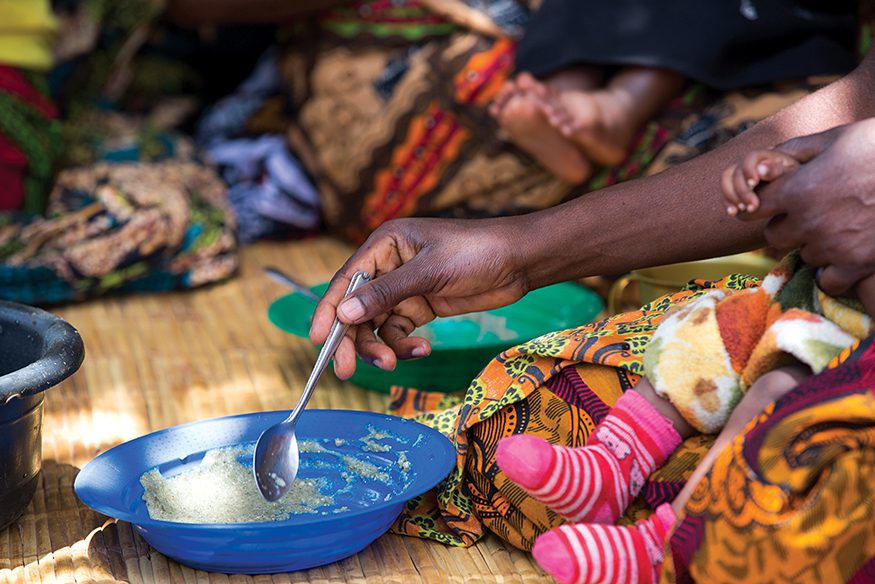By Jordan Teague
Bread for the World and its members can celebrate some important legislative victories this summer in the international arena. In early July, Congress passed both the Global Food Security Act (GFSA) and the Foreign Aid Transparency and Accountability Act (FATAA) with overwhelming bipartisan support. In addition, both chambers have now recommended $125 million for nutrition in global health programs for fiscal year 2017.
Bread had been campaigning for GFSA for two years, and Bread’s activists recruited nearly half of its co-sponsors one by one. Bread started lobbying Congress to support foreign aid reform with its 2009 Offering of Letters. And this year’s Offering of Letters focuses on maternal and child nutrition funding through the appropriations process in Congress.
We’ve advanced the cause on all three. But you may be wondering: How do all of these things fit together? Are they all related?
What GFSA does
The U.S. government has led the global effort to strengthen agriculture and nutrition in low-income countries through the Feed the Future initiative. Congress’ approval of GFSA will continue U.S. leadership against world hunger. By passing this legislation, Congress provides formal, bipartisan authorization to continue and extend this highly successful program of help and opportunity for some of the world’s most vulnerable people. GFSA will help provide agricultural and nutrition assistance to millions of poor rural families as well as locally purchased food assistance to help with the current surge of displaced people in Syria and other countries. GFSA also reinforces improved maternal and child nutrition as a key priority of U.S. agricultural assistance.
What FATAA does
FATAA focuses on tracking foreign assistance spending and programs across all U.S. government agencies involved in this area. It institutionalizes the important gains that have been made in increasing aid transparency and improving monitoring and evaluation practices over the last few years. FATAA will help to ensure that this progress is built upon when a new administration and Congress take office next year. The bill requires that detailed foreign assistance information be regularly updated on the ForeignAssistance.gov website and that development and economic assistance be rigorously monitored and evaluated.
What funding for global nutrition does
This is the area addressed by this year’s Offering of Letters: Survive and Thrive.
The funding for nutrition in global health programs through the appropriations process supports nutrition programs through the U.S. Agency for International Development (USAID). These programs provide lifesaving nutrition support to women and children around the world. Both the House and Senate Appropriations Committees recommended $125 million for these programs for fiscal year 2017. While this falls short of Bread’s request of $230 million through its Offering of Letters campaign, both chambers rejected the president’s proposed cut to the programs ($108.5 million) and recommended a strong investment in nutrition.
However, the appropriations process is not over yet. There will still be opportunities to increase the funding for global nutrition in fiscal year 2017 between now and when both chambers pass either the State and Foreign Operations appropriations bills or an omnibus appropriations bill.
Putting them together
The passage of GFSA and FATAA will strengthen the investment of $125 million in global nutrition programs even further. At USAID, these nutrition programs are often conducted as part of the Feed the Future initiative. The passage of GFSA enshrines the efforts of Feed the Future and makes nutrition a priority of U.S. government foreign assistance. FATAA will help to ensure the impact of U.S. government nutrition investments is maximized and the programs are held accountable to nutrition goals.
Again, Congress has not yet fully met Bread’s request of $230 for nutrition in global health programs, and this is disappointing. But advocacy does not yield complete victories all the time. Bread takes a long-haul and broader perspective in its advocacy, and even the medium-term perspective – looking at the results of this summer together – shows that we have ended up with more than we started with. Bread views all three congressional actions as victories that give us momentum in our work to end hunger, malnutrition, and poverty around the world.
Jordan Teague is international policy analyst for food security and nutrition for Bread for the World and Bread for the World Institute.



